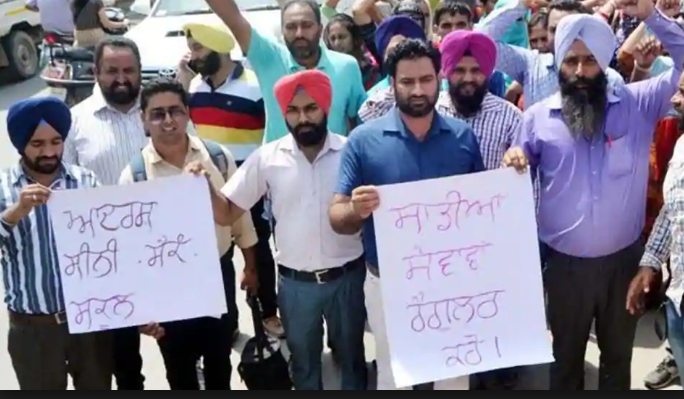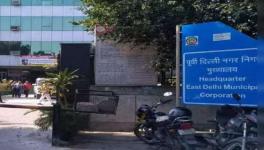Over 10 lakh Vacancies in Govt Schools, Contractual Teachers Continue to Face Difficulties

Image Coutesy: Hindustan Times
Contractual workers have been facing attacks from the state governments across the country for a long time now, irrespective of what sector they work in. Transport workers, teachers, anganwadi workers, National Health Scheme workers, they have time and again been forced to raise their voices and protest against unfair treatment by the state governments.
In the last five years, the education sector has seen numerous direct and indirect attacks from the Modi government, ranging from reduction of seats in higher education, complete dismantling of the reservation system, to drastic reduction of funds for public-funded educational system. The situation is not any better in most of the states either. The teachers, especially the contractual teachers working in government schools under various schemes, have been one of the worst affected sections in the recent past.
In Punjab, contractual teachers who were recruited under the central education programmes, Sarva Siksha Abhiyan (SSA) and Rashtriya Madhyamik Siksha Abhiyan (RMSA), have been protesting against the state education department since October, 2018. On October 3, 2018, the Punjab government had approved regularisation of 8,886 contractual teachers. However, this decision came with a catch. The teachers whose services were to be regularised would be paid a meagre sum of Rs 15,300 per months. These were the teachers who had been working on a salary of Rs 42,700 per month for several years, so this announcement came as an unexpected shock to them.
Immediately after this announcement was made by the state government, the teachers’ unions started protesting against it, led by Sanjha Adhyapak Morcha. The protest lasted for months, without the government paying any heed to the demands made by the teachers. The protestors accused the Education Secretary of cooking up numbers to show that most of the contractual teachers had opted for regularisation under the scheme. Several union leaders were transferred or suspended for taking part in the protests.
In February, the contractual teachers started protesting against the ‘Padho Punjab Padhao Punjab’ test being conducted by the government. They said that the test had a different syllabus than the regular syllabus, accused that the government was focussing on something ‘unnecessary’, instead of focussing on the real issues.
On January 14, the Chief Minister of West Bengal Mamata Banerjee announced that graduates would be employed as intern teachers in primary schools, at a salary of Rs 2,000 per month. Protests followed, and the education department was accused of trying to fill the empty posts in schools without having to recruit more teachers. During its time in power, the Mamata Banerjee government has repeatedly failed to conduct the Teachers Eligibility Test (TET) in a proper manner. During several years, the results were never announced, and even if they were, the recruitment process was not conducted.
In Delhi, more than 5,000 guest teachers protested outside Deputy Chief Minister Manish Sisodia’s residence on March 1 and 2. As many as 25,000 teachers from Delhi are facing uncertainty as their contracts ended on February 28. They were not notified by the government whether their services were terminated or if their contracts will be renewed.
Contractual teachers from several other state, including Uttar Pradesh, Jharkhand, Bihar, have been forced to protest in the past few years, demanding that they be treated fairly. They constitute a large number of teacher in the state and central government run schools.
On December 13, Dr. Satyapal Singh, the Minister of State for Human Resource Development responsible for higher education, said in Rajya Sabha that the number of vacant posts in elementary and secondary schools were 9,00,316 and 1,07,689 respectively. The number of sanctioned posts of teachers in elementary and secondary schools are 51,03,539 and 6,85,895 respectively. According to the data given by him, more than 10 lakh posts are vacant in government schools all over India.
This makes one wonder why instead of regularising the services contractual teachers to fill the empty posts, the state governments are trying to recruit more teachers on contract basis under various schemes. The contractual teachers are often forced to work at deplorable salaries and they are certainly not happy with their jobs, which is proven by the fact the they are protesting time and again in various parts of the country.
Get the latest reports & analysis with people's perspective on Protests, movements & deep analytical videos, discussions of the current affairs in your Telegram app. Subscribe to NewsClick's Telegram channel & get Real-Time updates on stories, as they get published on our website.
























